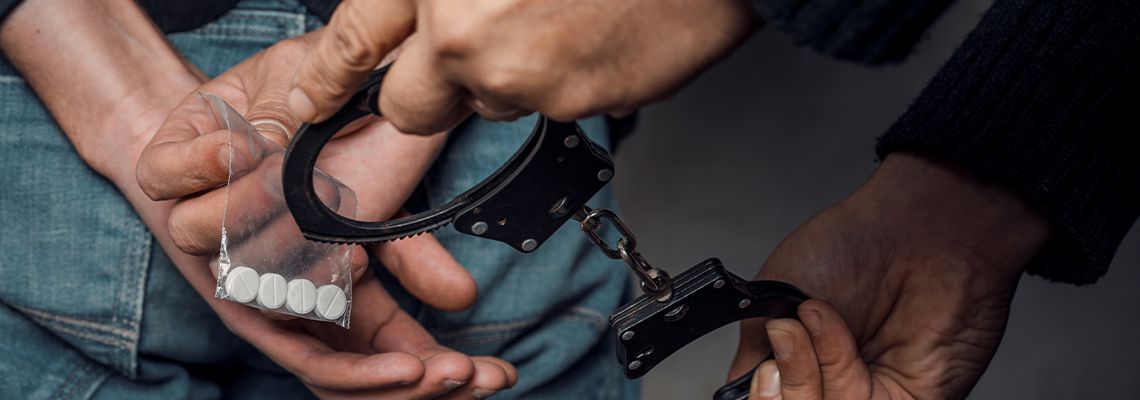When someone is facing drug possession charges in Iowa, the quantity of the drugs involved can significantly influence the severity of the charges and the potential penalties. Drug laws in Iowa are strict, and penalties increase with the amount of the controlled substance in question.

FAQs: Criminal Defense
If you or someone close to you has been arrested and charged with a crime, there’s a lot you’ll need to learn and understand about the criminal justice system, especially if this is a first offense. Factors like the actual charge you’re facing, whether it’s classified as a misdemeanor or a felony, and whether you have any convictions in your past will all affect your experience and what you can expect.
Working with an experienced criminal defense attorney can be immensely helpful during this time not only to defend your rights and represent your interests in court, but also to educate you about the process in general so you can make informed decisions about your situation. To speak with a skilled lawyer in Des Moines, Iowa, or anywhere throughout Polk County and the surrounding counties, call Balduchi Law Office, PC to set up a consultation.
Frequently Asked Questions About Criminal Defense
Do I have to speak to the police after I’m arrested?
No, you do not have to answer any questions that a police officer asks you after you’ve been arrested. However, you should still remain polite and calm in all your interactions. You can simply tell them that you won’t be answering any questions until you speak with your attorney.
I just want this to go away. Should I accept a plea deal?
There’s no set answer to this question since every case will be different. Only by working with your attorney will you be able to decide whether a plea deal is in your best interest.
What is the difference between a felony and a misdemeanor?
In general, misdemeanors are considered less serious crimes with less severe penalties (from 30 days to two years in jail), while felonies have more serious penalties. Under Iowa law, most crimes, like first-time DUI charges, simple assault, domestic violence, petty theft, and drug charges (like possession), are classified as misdemeanors, while crimes like murder, manslaughter, and many forcible sex crimes are classified as felonies.
If I'm completely innocent, do I still need a lawyer?
It’s a common misconception that if you’ve been charged with a crime that you didn’t commit that you don’t need legal representation, but this is incorrect. No matter what, you should always hire an attorney to represent you in criminal proceedings since the consequences can last a lifetime. There are a number of legal proceedings that must be handled correctly to move a case through this process, and it can be incredibly difficult for an individual to attempt this on their own.
When are police allowed to search my person, vehicle, or home?
Police need to have probable cause to perform a search without your consent. This means that the officer must be able to prove they had a reasonable belief that they would find incriminating evidence of a crime (such as a gun or drugs). If they don’t have probable cause, they must ask your permission to search your person, home or car. If they make this request and you don’t give permission, they’re prohibited from performing a search and anything they find will be inadmissible in court because they’ve violated your Fourth Amendment protection from unreasonable searches and seizures.
The police didn’t read me my rights. Am I still under arrest?
Just because an officer fails to read you your Miranda Rights does not mean that you won’t be arrested. What it does mean is that anything you say during the arrest may not be able to be used against you as evidence in trial. Assert your right to remain silent and stop talking.
What happens if I’m charged with a crime in Iowa but live in another state?
Whatever state the crime was committed in has jurisdiction to prosecute that crime. This means if you’re a resident of a neighboring state but are arrested in Iowa, you will likely have to face charges in Iowa.
How long does a criminal case typically last?
This answer will vary depending on the complexity of your case. Typically, misdemeanors will go faster than felonies, but it’s not uncommon for criminal cases to last several months or even over a year.
Can I clear a criminal charge from my record?
Expungements are possible in Iowa, but only available under certain considerations and for certain crimes. The best way to determine whether your case can be cleared from your criminal record is to consult with your attorney.
Do I really need a criminal defense attorney?
Yes. The single most important step you can take when facing criminal charges is to hire a competent and experienced attorney. You should never try to represent yourself in any stage of criminal proceedings. Even if you are guilty, your lawyer can increase your chances of a reduced sentence or receiving a jail alternative like a treatment or rehabilitation program.
Get the Honest Answers You’re Looking For
If you’re in the Des Moines, Iowa, area and want to learn more about what you can expect after being charged with a crime, reach out to Balduchi Law Office, PC today for help.
RECENT POSTS
Constructive possession is often used in situations involving shared spaces, such as cars, homes, or apartments. It can be a highly contested issue in court, as it relies on circumstantial evidence and interpretation of a person’s proximity, knowledge, and control over the location where the drugs were discovered.




